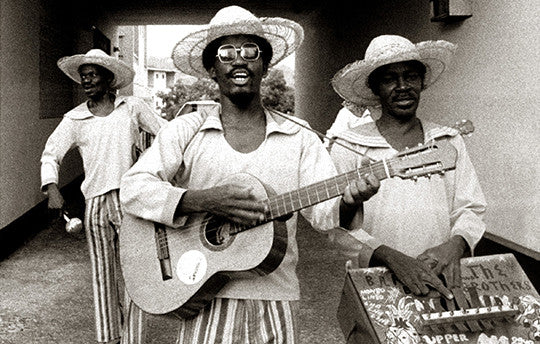Your Cart is Empty

The anthology of the best calypso from Trinidad from rare early recordings up to the zenith of the 1950s calypso craze. From the 1920s legendary string orchestras through the forties with the emergence of King Radio, to the worldwide recognition of calypso in the fifties with Lord Pretender, and the legends Lord Kitchener and The Mighty Bomber, The Rough Guide To Calypso Gold delivers a taste of real calypso.
The first mention of ‘Calypso’ comes from a dance, described by Abbé Masse in 1882. Otherwise, most scholars who have tried to trace the story of calypso agree that the word itself is not connected with the divinity who lured Homer’s Odysseus to her island. The origins of the word are not clear and scholars debate this with no definitive answer. The name possibly began with the French carrouseaux and went through patois and Anglicization — carrisseaux, calisseaux, caliso and finally to ‘calypso’. There are also suggestions that the name originated with exclamations of encouragement to the singer by the chorus or audience or both. But, whatever process brought the word ‘calypso’ into everyday use, the main thing is the calypso itself.
Quick wit, knowing observations of human behaviour and commentary on its absurd aspects are all elements of calypso, which prompted the American periodical Time to label calypso ‘The Living Newspaper’ in 1944. For eloquence and topical diversity, no other genre comes close to the calypso of Trinidad and Tobago. The Calypsonian assumes a stance between reporter, editorialist, moralist and satirist with commentary on scandal, disasters, politics, sexual indiscretion and everything from local to international affairs. Calypso songs, or kaisos, would outlive the colonial authorities who, at the time, were ignorant to the subtleties, innuendos and insinuations connected with calypso.
Robin Bryans wrote of the calypso, ‘No sacred cow, human or institutional is safe from the wit of the Calypsonian’, and Don Hill adds that ‘It is at once a social document of the country’s history, a compendium of the people’s language, an archive of their music. The Calypsonian serves his country equally as well as the griot of ancient Mali served his. But our native bard has not received the place of honour he deserves. Perhaps it is just as well. No honour or patronage should impede his freedom to speak out.’